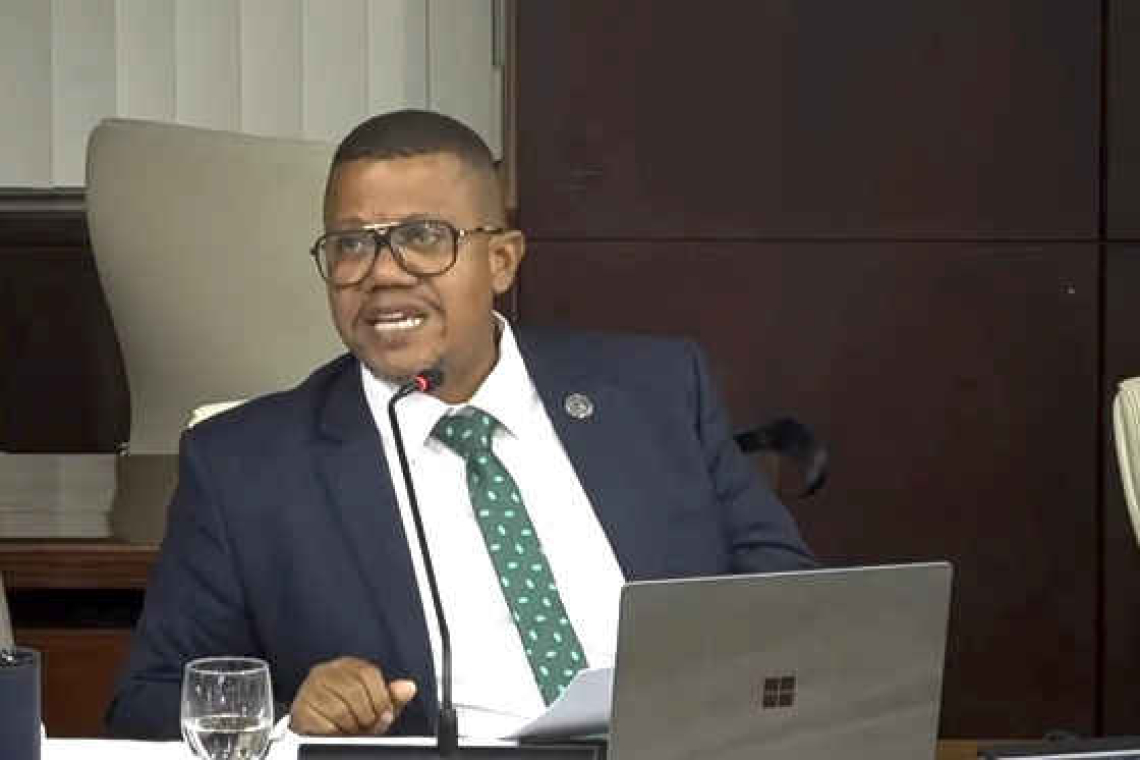UP MP Francisco Lacroes
PHILIPSBURG--Parliament erupted into controversy on Thursday after United People’s party (UP) Member of Parliament (MP) Francisco Lacroes opened his visual presentation by displaying an image of TEATT Minister Grisha Heyliger-Marten’s husband, former MP Theo Heyliger, who is currently incarcerated, triggering an immediate adjournment and a fierce debate over parliamentary conduct and the use of visual presentations.
Before showing the image, Lacroes said he had “enjoyed” the minister’s presentation, which included the findings of two damning reports on the transportation sector. Lacroes felt the presentation contained “undercover shots,” adding that anything he said on the floor he could repeat “outside of Parliament where there is no immunity.”
He challenged “anyone to call my name” outside of Parliament and then said, “I will bummel you,” directed at the minister, and referred to a quote the minister had posted on her page after he called for her resignation over her husband’s legal issues.
The showing of the image of the incarcerated former MP seemed to have stunned some MPs and temporarily derailed the meeting, which had been convened to discuss the minister’s plans for public transportation in general. The move led to a brief adjournment and the removal of Lacroes’ permission to use visuals in Parliament.
Democratic Party (DP) MP Sarah Wescot-Williams was one of the first to respond, warning that Parliament risked setting a dangerous precedent. She said ministers already have opportunities to make visual presentations and reminded colleagues that she had previously refused visuals until proper guidelines existed. “Until Parliament established it to be used for everybody,” she said, visuals should not be used selectively or weaponized.
UP MP Omar Ottley agreed that guidelines must be created for all meetings, cautioning that the incident had already shifted the meeting away from its purpose. “We are shifting the focus of the meeting,” he said. “Let’s get down to business.”
Soualiga Action Movement (SAM) MP Franklin Meyers stressed that MPs must uphold parliamentary conduct in all settings. He noted that while the minister’s presentation relied heavily on SOAB and Integrity Chamber reports – documents that would circulate publicly regardless – the decision to show a photo of Theo Heyliger crossed a line, particularly since the former MP was not present to defend himself.
Meyers recalled a past dispute with MP Ardwell Irion and said he had immediately apologized at the time because he held the office “in high regard.” Meyers warned that invoking individuals who are not present puts the entire nation “in a dangerous” place. Meyers also pointed out parts of the reports that stated the possibility that fraud “could have possibly happened,” and urged the committee to maintain perspective: “Today we are sitting here and tomorrow we might be sitting over there.”
Nation Opportunity Wealth (NOW) MP Lyndon Lewis said the organisation was being hypocritical. He argued that concerns about visuals could have been raised at the start of the meeting, including during the minister’s own presentation, which also used slides. “This could have been a closed-door meeting,” he said, questioning why objections had only been raised once Lacroes began speaking.
Committee Chair Viren Kotai reminded members that he would not allow presentations involving family members or individuals outside the debate. He permitted Lacroes to continue speaking, but blocked the visual component. “We will stick to the subject,” he said.
Lacroes then delivered a lengthy and emotional response. He said that for two years, he and his family had been threatened based on statements made by the minister, and the presentation he had just seen “did what has been happening,” describing it as filled with “little shots fired and little comments made.” He said he had stayed quiet “for too long,” adding, “Enough is enough.”
Lacroes questioned the credibility and consistency of the SOAB and Integrity Chamber findings, arguing there were “many contradictions” in the reports. He said he wondered “who gave them the information to make the reports,” asserting that the information had been provided “in a way to make sure that it looks as if something went wrong.”
He also challenged the narrow focus on 2023, stating that more than 200 licenses had been issued between 2014 and 2023 and that he had seen no official publication lifting the moratorium during those years. He cited the 2014 policy stating that G-plates should not be issued, yet he saw several G-plates issued between 2014 and 2023.
Lacroes also raised operational concerns he encountered while at the ministry. He said that while he was in office, four bus drivers had applied for taxi licenses and had been tested with questions to determine their knowledge of the island. Only one applicant passed. “The other three did not know the island,” he said.
On the minister’s current clean-up efforts, Lacroes insisted the narrative was never about fixing the system. “Four down, one more to go – that is what this was about,” he said. He argued that the confirmation letter should never have been cancelled, because without it, operators could not pick up plates or stickers.
He said, “I don’t have to be liked, but you will not sit here and say I did something I didn’t do. Everyone who ever asked me to help received help. But these hands have never ever done this, ever. And that needs to end today.”
National Alliance (NA) MP Ardwell Irion highlighted economic harm caused by license renting, sharing an example of someone forced to reach “US $1,000 a week” for the persons from whom they are renting “before I can start to make money.” He said “That is creating poverty,” and questioned how many entities hold multiple permits and rent them out without oversight.







